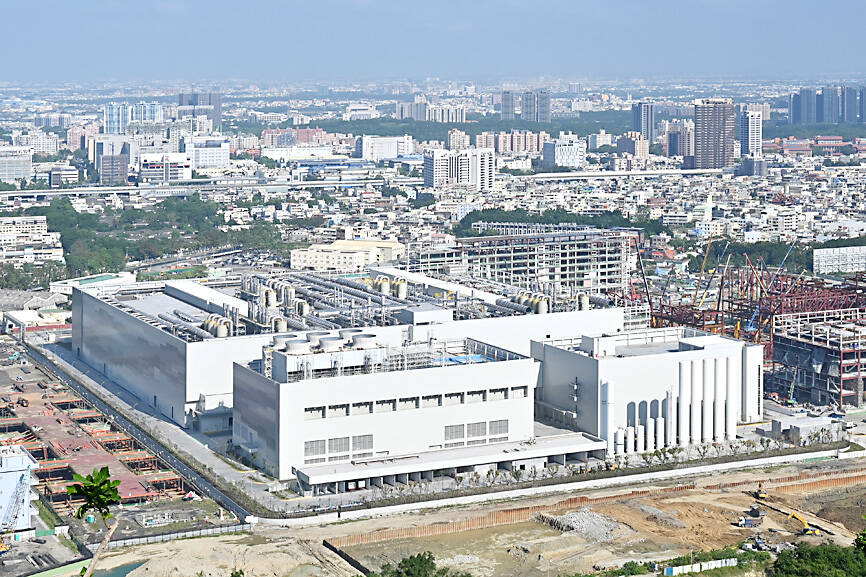Taiwan Semiconductor Manufacturing Co (TSMC, 台積電), the world’s biggest contract chipmaker, yesterday held an equipment installation ceremony for its first 2-nanometer fab in Kaohsiung, six months ahead of schedule, Kaohsiung Mayor Chen Chi-mai (陳其邁) said.
“To cope with the strong global demand for advanced chips, TSMC is to start moving in equipment for its first-ever 2-nanometer fab half a year earlier than scheduled,” Chen said at an question-and-answer session at the Kaohsiung City Council.
TSMC’s 2-nanometer process technology would help accelerate the development of artificial intelligence (AI) applications as well as the transformation of local industries in Kaohsiung, Chen said in a statement released by the city government.

Photo: Lee Hui-chou, Taipei Times
Chen, who attended the TSMC ceremony, said the chipmaker plans to build four more fabs in Kaohsiung.
Aside from TSMC, many semiconductor-related material, equipment and parts suppliers have set up operations in the city, he said.
Together with TSMC’s 3-nanometer and 5-nanometer fabs, the southern part of Taiwan would create the most valuable semiconductor clusters in the world, Chen said.
TSMC, based in Hsinchu, yesterday reiterated that its 2-nanometer technology development is progressing well with device performance and yield on track or ahead of plan.
The chipmaker said in an e-mail to the Taipei Times that it is on track for volume production next year.
TSMC is also building a 2-nanometer chip production line in Hsinchu.
TSMC chairman and CEO C.C.Wei (魏哲家) told investors last month that demand for the new technology was “more than we ever dreamed about.”
“We are seeing more demand for 2-nanometer than 3-nanometer capacity,” he said.
Demand for A16 is also “very high” for AI server chip production, “so we are working very hard to prepare both 2-nanometer and A16 capacities.”
The 2-nanometer chips would be primarily used in smartphones and high-performance computing applications, the company said.
Apple Inc and Micro Devices Inc are likely to be among the first adopters of TSMC’s 2-nanometer chips.

DAREDEVIL: Honnold said it had always been a dream of his to climb Taipei 101, while a Netflix producer said the skyscraper was ‘a real icon of this country’ US climber Alex Honnold yesterday took on Taiwan’s tallest building, becoming the first person to scale Taipei 101 without a rope, harness or safety net. Hundreds of spectators gathered at the base of the 101-story skyscraper to watch Honnold, 40, embark on his daredevil feat, which was also broadcast live on Netflix. Dressed in a red T-shirt and yellow custom-made climbing shoes, Honnold swiftly moved up the southeast face of the glass and steel building. At one point, he stepped onto a platform midway up to wave down at fans and onlookers who were taking photos. People watching from inside

A Vietnamese migrant worker yesterday won NT$12 million (US$379,627) on a Lunar New Year scratch card in Kaohsiung as part of Taiwan Lottery Co’s (台灣彩券) “NT$12 Million Grand Fortune” (1200萬大吉利) game. The man was the first top-prize winner of the new game launched on Jan. 6 to mark the Lunar New Year. Three Vietnamese migrant workers visited a Taiwan Lottery shop on Xinyue Street in Kaohsiung’s Gangshan District (崗山), a store representative said. The player bought multiple tickets and, after winning nothing, held the final lottery ticket in one hand and rubbed the store’s statue of the Maitreya Buddha’s belly with the other,

‘NATO-PLUS’: ‘Our strategic partners in the Indo-Pacific are facing increasing aggression by the Chinese Communist Party,’ US Representative Rob Wittman said The US House of Representatives on Monday released its version of the Consolidated Appropriations Act, which includes US$1.15 billion to support security cooperation with Taiwan. The omnibus act, covering US$1.2 trillion of spending, allocates US$1 billion for the Taiwan Security Cooperation Initiative, as well as US$150 million for the replacement of defense articles and reimbursement of defense services provided to Taiwan. The fund allocations were based on the US National Defense Authorization Act for fiscal 2026 that was passed by the US Congress last month and authorized up to US$1 billion to the US Defense Security Cooperation Agency in support of the

HIGH-TECH DEAL: Chipmakers that expand in the US would be able to import up to 2.5 times their new capacity with no extra tariffs during an approved construction period Taiwan aims to build a “democratic” high-tech supply chain with the US and form a strategic artificial intelligence (AI) partnership under the new tariffs deal it sealed with Washington last week, Taipei’s top negotiator in the talks said yesterday. US President Donald Trump has pushed Taiwan, a major producer of semiconductors which runs a large trade surplus with the US, to invest more in the US, specifically in chips that power AI. Under the terms of the long-negotiated deal, chipmakers such as Taiwan Semiconductor Manufacturing Co (TSMC, 台積電) that expand US production would incur a lower tariff on semiconductors or related manufacturing